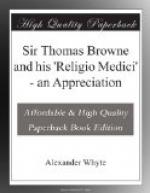Transcribed from the 1898 Oliphant Anderson & Ferrier edition by David Price, email ccx074@coventry.ac.uk
Sir Thomas Browne and his ‘Religio medici’: an Appreciation with some of the best passages of the Physician’s Writings selected and arranged by Alexander Whyte D. D.
[Illustration from 1642 edition of Religio Medici: ill.jpg]
Oliphant Anderson & Ferrier
Saint Mary Street, Edinburgh, and 21 Paternoster Square, London 1898
Dedicated to
sir Thomas Grainger Stewart
President of the British medical
association
at whose request this appreciation
was delivered as
the inaugural discourse
at the opening meeting of
the association
in st. Giles’ Cathedral
on the 26th July 1898
in great good-will and love
by
Alexander Whyte
APPRECIATION AND INTRODUCTION
The Religio Medici is a universally recognised English classic. And the Urn-Burial, the Christian Morals, and the Letter to a Friend are all quite worthy to take their stand beside the Religio Medici. Sir Thomas Browne made several other contributions to English literature besides these masterpieces; but it is on the Religio Medici, and on what Sir Thomas himself calls ‘other pieces of affinity thereto,’ that his sure fame as a writer of noble truth and stately English most securely rests. Sir Thomas Browne was a physician of high standing and large practice all his days; and he was an antiquarian and scientific writer of the foremost information and authority: but it is the extraordinary depth and riches and imaginative sweep of his mind, and his rare wisdom and wealth of heart, and his quite wonderful English style, that have all combined together to seal Sir Thomas Browne with his well-earned immortality.
Sir Thomas Browne’s outward life can be told in a very few words. He was born at London in 1605. He lost his father very early, and it must have been a very great loss. For the old mercer was wont to creep up to his little son’s cradle when he was asleep, and uncover and kiss the child’s breast, and pray, ’as ’tis said of Origen’s father, that the Holy Ghost would at once take possession there.’ The old merchant was able to leave money enough to take his gifted son first to Winchester School, and then to Oxford, where he graduated in New Pembroke in 1626. On young Browne’s graduation, old Anthony a Wood has this remark, that those who love Pembroke best can wish it nothing better than that it may long proceed as it has thus begun.




